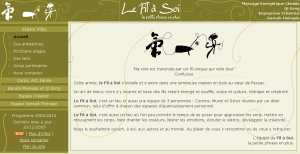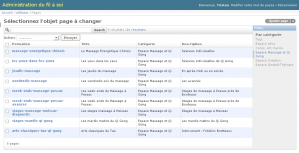Django better than a CMS?
I recently had to rewrite a website I’m maintaining for a very small business: Le fil à soi. They are 3 teacher who offer courses of chinese massage, qi gong and Gestalt therapy in Bordeaux, France. The requirements for the website are quite simple:
- presentation of the place, the people, and contact information
- pages for all courses sorted in categories
- automatic management of courses dates display and RSS feed generation
- simple backend to modify courses information (should be used by the teachers, although they don’t really like computers and prefer sending me an email…)
The version I wanted to replace was a hand-made PHP website. I started it years ago when I knew little about websites technical design, so it had become really messy and complicated to maintain. I considered letting someone else maintain the website, so I needed a cleaner version.
Using a CMS: Drupal or WordPress
A CMS (Content Management System) is a platform that makes building a website easy. WordPress is particularly intended to create blogs, but there are plenty of plugins that enable to create any type of websites. Drupal is really made to build websites of any type. There are plenty of plugins too that address about every possible needs (calendar, online shop…)
The strength of these CMSs is that they manage the two parts of the website: the user part, and the administration part. The administration part gives you many simple ways to personalize and watch the user part.
I started two small prototypes using these CMSs and came to the same conclusion: none of them perfectly addresses my very simple needs.
For example for the courses dates managment: plenty of plugins do something close enough to what I want, but none do it exactly. So I will have to personnalize a plugin, probably without real documentation of the code. This plugin will then be updated (without documentation again) by its author, and I’ll have to maintain my changes again and again…
It’s the same for the theme: plenty of themes are available but I can’t seriously download and use a design without customizing it.
So I can make my very simple website using a CMS but:
- the result will be huge, with plenty of features I won’t use (no blog, no users management needed…)
- it will be difficult to maintain, and I will have to watch updates to the plugins I have customized
- I will have to make regular updates when the CMS is updated, because known security flows of well-known CMSs are rapidly used by “hackers”
This is a lot of work for such a small website.
Using Django
Django isn’t really a CMS. It’s a Python framework to build websites (comparable to PHP Zend, Ruby On Rails…). So it means that you have to actually write code to use it.
The huge difference with other web frameworks is that Django has originally be developped for a news website, so content management was very important. That’s why an impressive feature is available: an automatic administration generation.
I just had to define my models (what a course is, what a teacher is, what a date, a category is). Then it was mapped to my database and the administration part was generated. I finally defined my views, that is to say the way these models are displayed to the users (with simple tools to generate RSS feeds, sitemaps…)
The advantages of this approach are:
- the final application is very small, no useless features
- you get exactly what you want, you haven’t to adapt to random plugins found on the Internet
- you know perfectly what each line of code does (even if you don’t document it…)
- the only updates you have to watch are Python and Django updates, that are rare and usually well managed
The only possible drawbacks I see:
- There are much fewer people who are used to Python Django than people who are used to WordPress, so it will be more difficult to find maintainers (but they will be better :p)
- Python has to be properly supported by you host. I use OVH, that supports Django only in CGI, but it’s okay for such a small website.
- There is no WYSIWYG editor by default in Django-generated administration: this can be bad to edit articles (or courses descriptions for me). But it’s fairly easy to add TinyMCE as it’s purely javascript.
Conclusion
If you want to create a simple full-featured blog, use WordPress. If you want complicated features like an online shop, use Drupal.
But if you want to build a simple, dynamic and easy to maintain website, and coding doesn’t scare you too much, use Python Django. You will get exactly what you want, without much efforts, and the result will be very easy to maintain.

